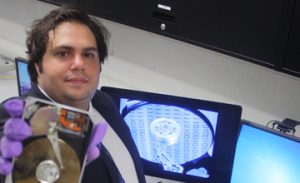Dr. Ibrahim Baggili, assistant professor at UNH, presented “The State-of-the-art in Cyber Forensics: Now & Tomorrow,” Wednesday, Feb. 18, at 2 p.m. His talk was sponsored by friends of the UNH library and was the first in this year’s spring series.

(Photo obtained via http://www.chooseunh.com)
Baggili’s research includes cyber forensics from technical, social and psychological perspectives and finding ways of improving the scientific validity of the field. He has worked closely with law enforcement and published work on real challenges facing cybercriminal investigators, and has presented and chaired conferences worldwide.
At UNH, Dr. Baggili teaches Computer Science, so during his presentation he spoke of not only his own work, but also the work he and his students are currently working on.
Baggili started his talk by explaining some of the misconceptions that people have of his field of work, where he showed various pictures illustrating, “what my mom think I do,” “what my friends thinks I do,” and “what I think I do.”
However, Baggili said what they really do is this: “we find ways to break computers in order to improve them.”
He then introduced some background facts regarding cyber forensics. As of 2014, the United States ranked number three in the number of mobile users and number two in the number of Internet users, which highlights the increase in penetration of technology. This then led to his discussion about security and a test that he and his students preformed on Apps such as ooVoo, OKCupid and Instagram.
Their studies revealed that many apps people use everyday are vulnerable to being hacked. The person doing the “hacking” is called a “script kitty” and they capture what is being sent back and forth if the content isn’t encrypted.
Baggili then explained the importance of forensics involving not only science, but law. This means that there is a very thin line between using this technology for investigation and invading one’s privacy.
There have been many improvements made in the field of cyber forensics, some of which include triage, similarity matching and rise of research and education, and there are also many projects in progress. However, the field continues to face struggles such as lack of multidisciplinary research initiatives, lack of common knowledge and changing technology. Dr. Baggili concluded his presentation by saying, “there is no good science without art.”










